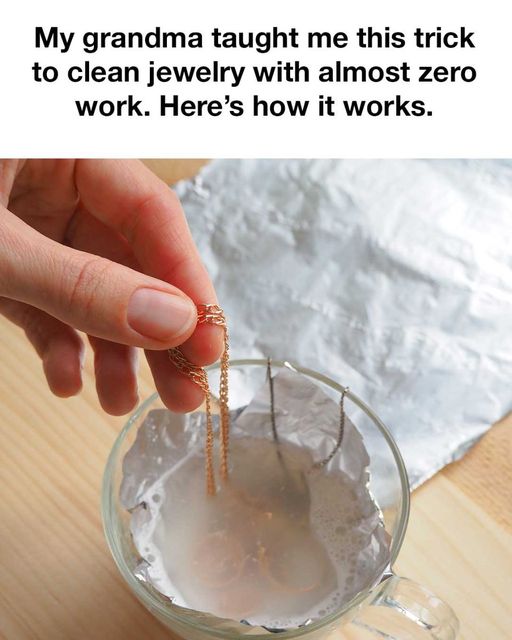ADVERTISEMENT
Step 2: Add the Cleaning Agents
Add one tablespoon of baking soda and one tablespoon of salt to the hot water. The baking soda will help to neutralize acids and break down dirt, while the salt enhances the electrolytic reaction that will pull tarnish away from your jewelry.
You can also add a drop or two of mild dish soap at this stage. The dish soap helps to dissolve any grease or oil that might be on the jewelry, making the cleaning process even more effective.
Step 3: Immerse the Jewelry
Place your jewelry pieces into the bowl, ensuring they make contact with the aluminum foil. The foil will create a slight electrical current that helps to loosen the tarnish on the metal. You may notice some bubbling or fizzing—this is a good sign that the chemical reaction is taking place.
Step 4: Wait and Watch
Let the jewelry soak in the solution for about 10-15 minutes. During this time, the baking soda and salt will work together to lift away dirt and tarnish, while the aluminum foil pulls the tarnish off the metal.
For particularly tarnished pieces, you may need to leave them in a bit longer. If you’re in a hurry, you can gently rub the jewelry with a soft cloth or a toothbrush to speed up the process.
Step 5: Rinse and Dry
After soaking, remove the jewelry from the bowl and rinse it under cool, running water. Make sure to rinse thoroughly to remove any residue from the cleaning agents.
Pat the jewelry dry with a soft cloth. Avoid using tissues or paper towels, as these can leave fibers on the jewelry or cause scratches. For pieces with intricate designs, you can use a soft toothbrush to reach into crevices and ensure all dirt is removed.
Why This Trick Works So Well
This cleaning method works thanks to a bit of chemistry. The aluminum foil, baking soda, and salt create a reaction that lifts tarnish from the metal. Tarnish is a layer of corrosion that forms when metals like silver react with sulfur in the air. The aluminum foil attracts the tarnish through a process called ion exchange, effectively transferring the tarnish from your jewelry onto the foil.
The hot water and baking soda help to loosen dirt and grime, while the dish soap cuts through any oils or residues that have accumulated on your jewelry. This combination not only cleans your jewelry but also restores its original shine without the need for harsh chemicals or intensive scrubbing.
A Few Extra Tips
Avoid using this method on pearls, opals, or other porous gemstones. These stones are delicate and can be damaged by the ingredients in this solution. For these types of jewelry, stick to gentle cleaning with a soft cloth or consult a professional jeweler.
Test before you clean: If you’re unsure about how your jewelry will react, test the solution on a small, inconspicuous area first. This ensures that your piece won’t be damaged by the cleaning process.
Regular maintenance: To keep your jewelry looking its best, try to clean it regularly using this method. It’s also a good idea to store your jewelry in a cool, dry place, away from direct sunlight and chemicals.
Advertisement
Cleaning your jewelry doesn’t have to be a laborious chore. With my grandma’s simple trick, you can keep your favorite pieces sparkling with almost zero effort. This method is cost-effective, easy to do, and works for most types of jewelry. Next time your rings, necklaces, or bracelets start to look a little dull, give this trick a try—you’ll be amazed at the results!
ADVERTISEMENT
